Last week, Lena Waithe’s new half-hour comedy Twenties premiered on BET. In it, Hattie, a 24-year-old masculine-of-center black lesbian struggling to break into the television industry, lives and loves in Los Angeles with her two straight best friends, Nia and Marie. Part romantic comedy, part sitcom about the ups-and-downs of chosen family, and part Hollywood satire — Twenties brings A LOT to the table. Not to mention that it’s historic, with the FIRST black masc lesbian to ever serve as the protagonist of a television comedy.
The soundtrack and beautifully lit skin tones of Twenties promise to stay with you long after you’ve clicked away from the show. It also finds itself squarely within a “black renaissance” (to quote Hattie’s own words) of television that begs the question: Where do we go from here?
Carmen: In a recent interview with The New York Times, Lena Waithe described her Twenties protagonist, Hattie, as entering “our world post my character on ‘Master of None;’ it’s a world post ‘Get Out’; it’s a world post ‘Moonlight'” — that feels like as good a place to start our conversation as any.
We both loved Denise in Master of None, in fact we ranked her in the Top 10 of Autostraddle’s The 100 Greatest Queer and Trans Women of Color Television Characters in TV History list. Of course that role, and the writing of her famous coming out episode which gave Lena Waithe a historic Emmy win as the first black woman to win for comedy writing, skyrockted her career. Looking back to 2017 — did you, like Lena, find connections between Denise and Hattie?
Natalie: I think she sees Master of None as a stepping stone, right? Like, audiences fell in love with a masculine-of-center lesbian character in “Thanksgiving,” so now let’s give a masculine-of-center lesbian character more of a prominent role and see if we can replicate those results.
Just a little Thanksgiving dinner small talk. pic.twitter.com/INoVWJFuSo
— Master of None (@MasterofNone) May 19, 2017
I guess I’d ask if you see that rhetorical leap — from Master of None to Twenties — as a logical one?
Carmen: To be honest, I’m not sure! If you look at the very short history of black butches on TV (there’s been just 22 of them in all of television, according to Autostraddle’s database) then sure — there’s a leap to be made between Master of None and Twenties. If only because there’s so few too begin with! Even as television and film gets queerer with every passing year, there’s still not nearly as much growth as I think we’d all like for black masculine-of-center characters that aren’t… well… played or written by Lena Waithe (or in some other cases, Samira Wiley, if we’re keeping it real with each other).
At the same time, I think making that leap shortchanges that part of what sets Twenties apart is, as you pointed out, it’s the first time ever that a black masculine-of-center lesbian is the PROTAGONIST in her own comedy series on television. And we can add to that the fact that this series exists on a historically homophobic black network.
I’ve said before that I think that what Lena Waithe’s doing at BET is game changing. That’s going to be particularly true this spring, when she has an hour of television on the network completely to herself with two half-hour comedies that have prominent black lesbian roles! Shout out to Lala Milan’s Tia in Boomerang; I still believe she gave one of the best and funniest performances in gay television last year.
Natalie: I’m so excited for the return of Boomerang on Wednesday night and I’m looking forward to seeing how it pairs with Twenties. Like you, I think the queer representation on Boomerang — from Tia to Rocky to Ari — was 100% the best I’d ever seen on BET and, honestly, some of the best black queer representation I’ve see on any network.
Carmen: Talking about queer as hell things happening over on BET…. oh my Lorde, Twenties’ opening sex scene!
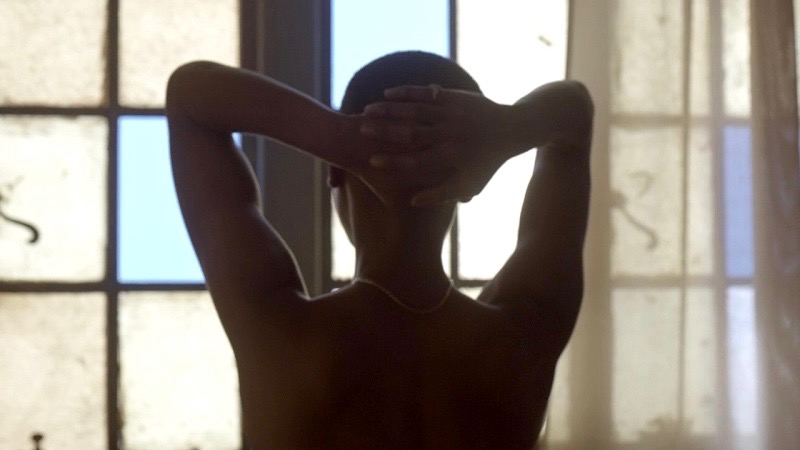
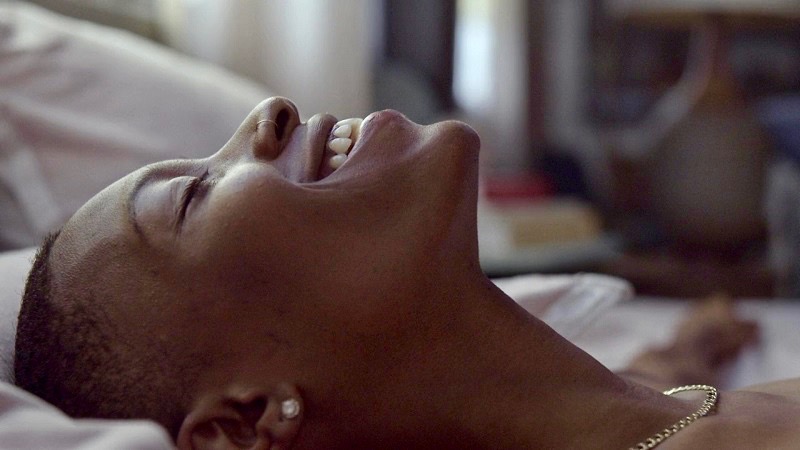
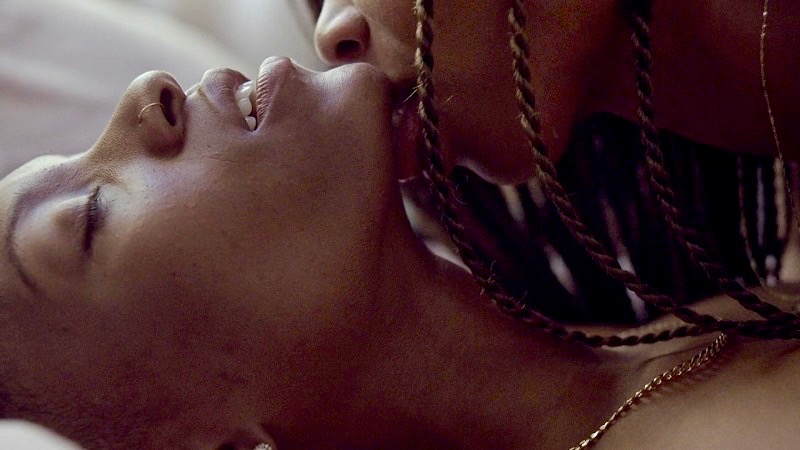
Natalie: What can I say, Lena certainly knows how to get my attention?
Carmen: I LOVE the song! “I Got Melanin” been stuck in my head for days thanks to this show.
Also, if you had bet me like ten grand and a pair of VIP Rihanna tickets that I’d live to see a full-on lesbian sex scene on BET in my lifetime, I would’ve taken that bet in a heartbeat. And I would’ve played myself. I never — and I mean NEVER — thought we’d end up here.
Part of what really struck me was is that it’s so clear these women are having sex — and for a long time! BET is very likely always going to be more conservative than some of the other cable networks that we’ve come to associate with lesbian sex, say for instance, Starz or Showtime. But that said, these women aren’t giggling and kissing necks, you know? They aren’t laying on their backs with their sheets up to their necks.
And the way all that brown skin is lit and shot by the camera? My God! Damn fucking sexy.
Natalie: There’s a frankness about the scene that kind of announces, before you even get to know Hattie, how unapologetic this show will be in its queerness.
Carmen: YES! I was just thinking about that! Because we are living in Hattie’s world, there’s no limits around her blackness or her queerness.
We rarely get to see that on television, because so often — particularly on black tv shows — when there even is a queer character, she’s a best friend, sibling, or otherwise sidekick. Centering Twenties on Hattie opens up an entirely different world of opportunities, you know?
Even from an aesthetics point of view! Sure, I think there’s probably one or two (or a dozen) too many vintage Whitney Houston shirts on Twenties, but at the same time, the reclamation of Whitney as a queer icon is about the most black and queer statement that a show could make — one that feels very real to pretty much every queer black person I know in my life. Also, every stud I’ve ever dated has a James Baldwin collection, to the point that it’s now something my friends make fun of. (Yes, I have a type! Yes, my type is Hattie! Yes, this show called me out.)
PS: Hattie’s kicks collection is flawless. Which really shouldn’t be overlooked.
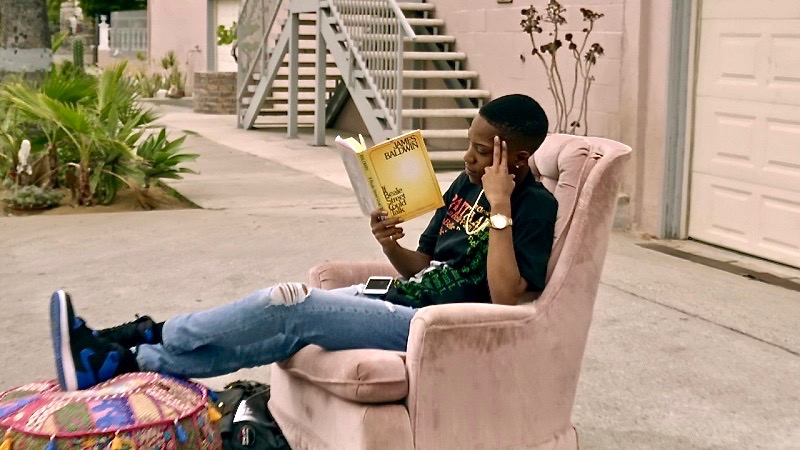
Natalie: Ok, but if you get evicted, are you leaving your collection on the sidewalk while you go see All About Eve? No, you are not.
The Whitney references are plentiful! T-shirts, the sing-along…
Carmen: I think we’re actually stumbling into what I find to be one of Twenties greatest weaknesses — it’s entirely too much of Lena Waithe’s actual, well-documented life, barely re-painted and put on the screen.
Obviously writers are encouraged to write what they know, but a little creative distance never hurt anyone. Lena’s a well-publicized Whitney fan, her favorite movie is All About Eve. And of course there’s the assistant job for the fictional black TV powerhouse Ida B. (I assume we were going for a play on Ida B. Wells here, but that’s a swing and a miss for me). Lena’s spoken extensively about spending her twenties working as an assistant for black women in Hollywood powerhouses Mara Brock Akil (Girlfriends, The Game), Ava DuVernay (Selma, Queen Sugar, When They See Us), and Gina Prince-Bythewood (Love & Basketball, Beyond the Lights).
There’s a line between autobiography and satire, and Twenties trips it all the time. I don’t get the feeling that the murkiness was intentional. Ugh! Did you also find that off-putting?
Natalie: A little, yes… because Hattie doesn’t feel like a new character to me.
She feels like the Hattie we originally met in Lena Waithe’s Twenties Pilot Presentation back in 2013 that’s still available on YouTube (though, obviously, she’s masculine-of-center here whereas she was very femme in the original). She feels like the Lena Waithe we’ve met in interviews over the years. It puts us — as members of the queer community who’ve really watched Lena’s rise intently — in a weird situation of spending an hour with a new character that we already know.
I understand why you’d say that the murkiness was unintentional but it also feels like because we know Lena, we don’t have to know why Hattie wants to be a writer. Because we know Lena’s story, we don’t have to know why her conversations with her mother feel simultaneously close and distant.
Like, they’re using Lena as a shortcut to avoid telling the story in holistic way?
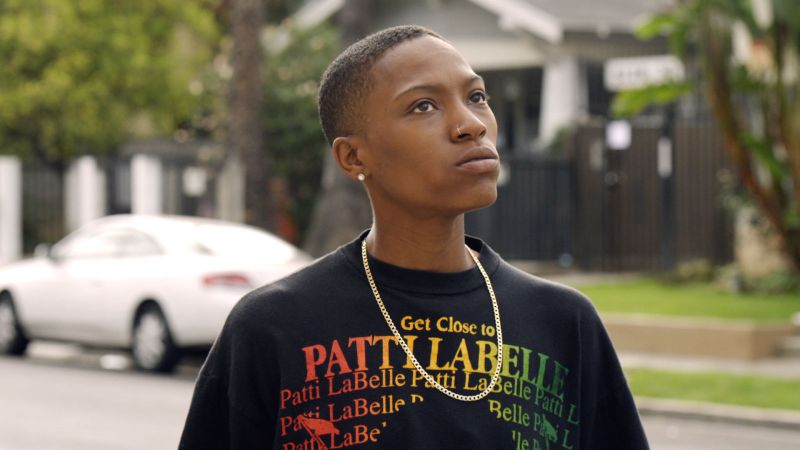
Carmen: I think you’ve really nailed why I didn’t connect to Twenties, and I WANTED to. You know that there isn’t a black butch character on television that I can’t find my heart towards. Especially one with those dimples and wearing Air Force Ones. But try as I might, Hattie left me cold.
I suppose there’s a lot about Twenties that’s exciting and brand new if you haven’t been closely watching the latest wave of black television, especially that coming from either Lena or her frequent co-conspirator Justin Simien (who directed the 2013 Twenties Pilot Presentation you’re talking about, in addition to directing and co-executive producing Dear White People the film with her in 2014) — but watching it, all I thought about was Netflix’s Dear White People, or Spike Lee’s She’s Gotta Have It. These are black shows that premiered within the last three years, have queer black women characters, and use similar “woke Millennial black aesthetic” visuals as a means of not having to dig deep into actually writing black characters that feel real.
I also thought a lot about what Lena has been doing with Boomerang, her other BET creation. Boomerang has an overlapping vibe with Twenties, but based on the episodes I’ve seen thus far, goes much further in authentically showcasing multiple black points of view that doesn’t depend on obvious catch phrases and t-shirt slogans.
Twenties feels like it’s cutting corners. It wants to satirize black Hollywood, but no so much that you loose track of Hattie’s earnest dream to become a writer. It wants to write a love letter to the friendship between black women, but without having to take the time to build up the characters first. Why do these women love each other? I have no idea.
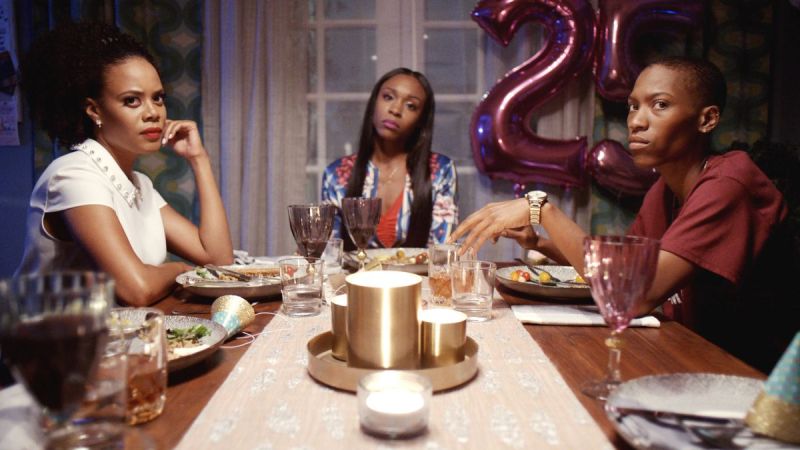
Natalie: They must love each other because if Hattie was at a table across from me and outed the details of my sex life to a room full of people, we would’ve been fighting!
What were your first impressions of Hattie’s friends, Nia and Marie? Thus far I feel like we haven’t really gotten to know them.
I recently rewatched the original Twenties presentation and its interesting to see how much of Hattie has been transferred over to Nia because they’ve chose to center a MOC character. There’s a shot in the BET version where we’re left in a dressing room with Nia staring intensely at herself in the mirror — for what? we never find out — but in the original that moment happens with Hattie
Carmen: That’s really interesting to point out!
Yeah, mostly I just hope we get to know them better. If I struggled to connect to Hattie because she feels badly drawn, then Nia and Marie are cardboard cutouts. They’re Regine and Synclaire from Living Single; they’re Toni and Lynn from Girlfriends. They haven’t been given a voice of their own.
Natalie: So, during the first episode there’s an exchange between Nia and Hattie that struck a cord with me. Nia says, “We need to support black shit.” and Hattie answers back, “No, we should support good shit that just happens to be black.”
I think, if we were talking about almost anything else, I’d side with Hattie. But that’s a conundrum with Twenties — because I don’t actually think it’s “good shit.” At least not yet. So now I’m back to Nia’s side, supporting queer black shit just because it is queer black shit… and hoping that this show eventually lives up to the bar that Lena Waithe set from the outset of her career.
I couldn’t figure out if that line was the most self-aware or the least self-aware thing I’d ever heard! What do you think? Should we be supporting Twenties just because it’s queer black shit or….
Carmen: If I knew how to answer that question, I’d go ahead and retire.
You can find Twenties on BET, Wednesdays, 10pm EST.



This is pretty much how I feel about Lena Waithe’s recent stuff. I want to love it but I don’t.